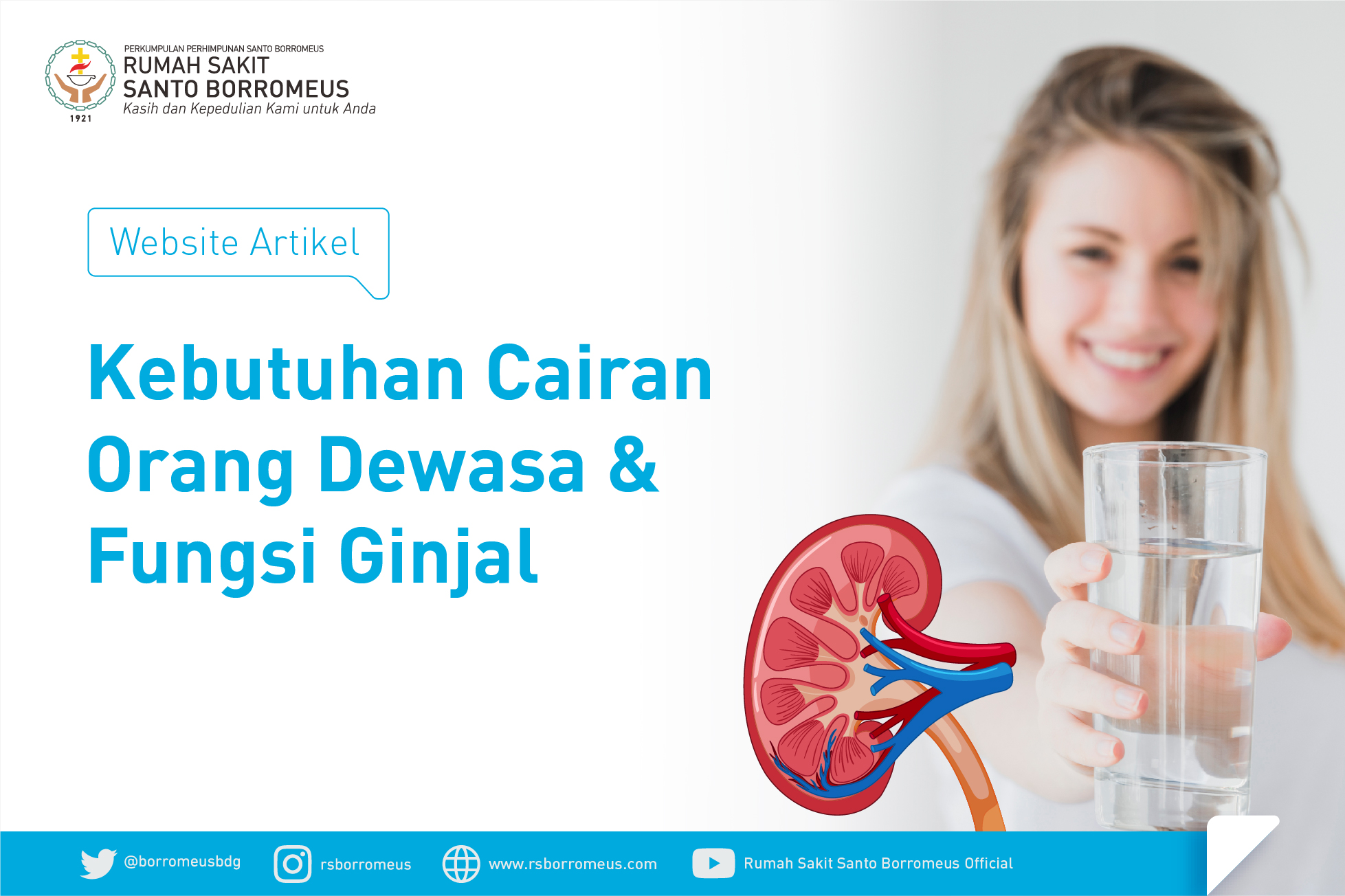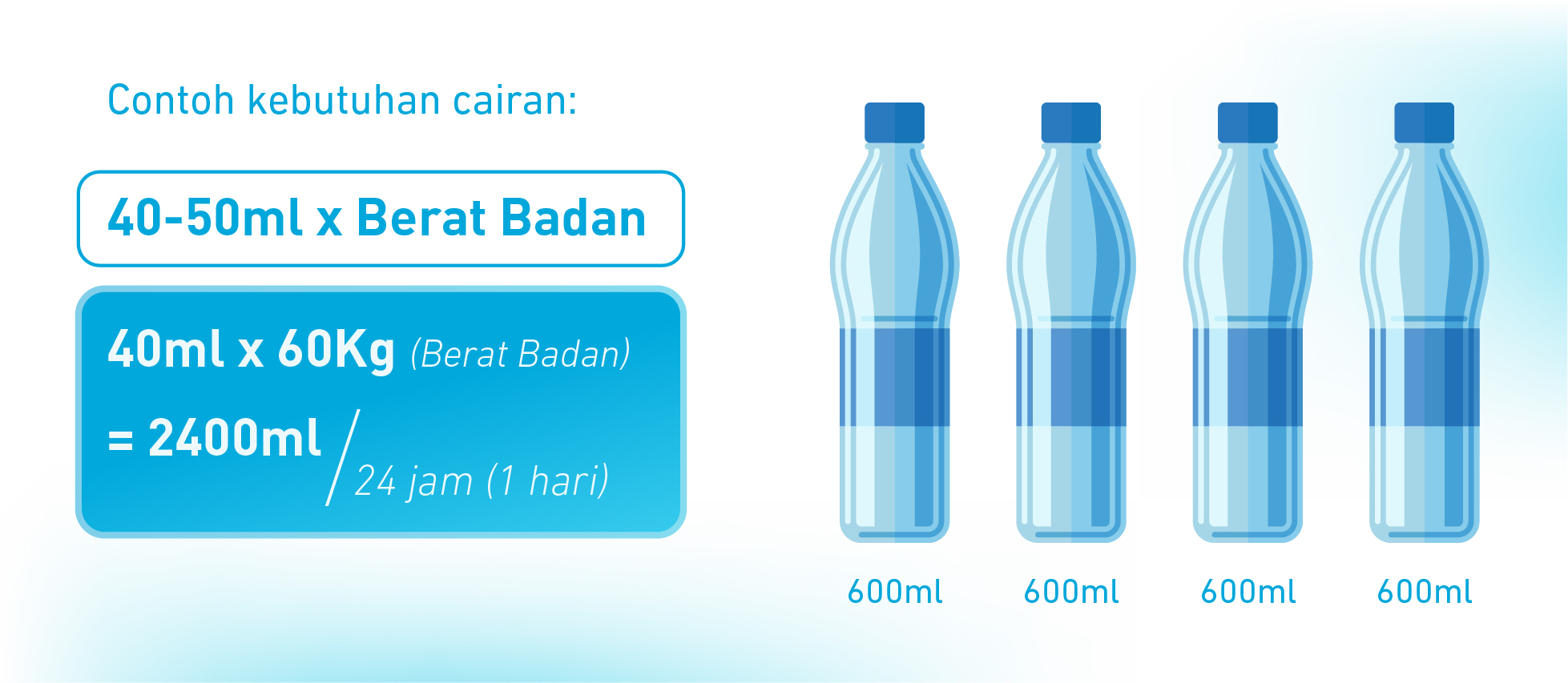
Body Fluid Requirements & Kidney Function
In adults, human body fluid is 50-60% of body weight. Of the percentage (50-60%), 40% of the fluid is intra-cellular (inside the body).
Body Fluid Balance
Fluid needs 40-50 ml / KgBB / 24 hours, fluid expenditure (urine): 1-2ml/ KgBB/ Hour

Apart from drinks, fluid intake can also be obtained from food and fruits/vegetables.

In addition to the elimination of fluids through urine (urine), fluid expenditure in the human body can also be through evaporation, skin, and feces during defecation. However, the amount of expenditure depends on the activity and metabolism of each person.
Kidney Function
The kidneys are one of the important organs of the body that functions to maintain blood composition by preventing the accumulation of waste products, controlling fluid balance in the body, maintaining stable levels of electrolytes such as sodium, potassium, and phosphate, controlling blood pressure, and red blood cells and producing hormones and enzymes that help in the formation and maintenance of healthy blood pressure and keeping bones strong.
Every day, both kidneys filter about 120-150 liters of blood and produce about 1-2 liters of urine. The kidneys also produce the enzyme renin, which maintains blood pressure and salt levels, the hormone erythropoietin, which stimulates the bone marrow to produce red blood cells, and the active form of vitamin D, which is necessary for bone health.
Signs and symptoms associated with kidney disease are usually very common (and can be seen in other diseases as well).
› High blood pressure
› Changes in urine volume and number of urinations per day
› Presence of blood in the urine;
› Weakness and sleep disorders
› Loss of appetite
› Headache
› Inability to concentrate
› Itching
› Nausea and vomiting
› Swelling, especially in the feet and ankles, and swollen eyelids when you wake up in the morning
Prevention of Chronic Kidney Disease
Prevention of kidney disease must be done early
- Regular medical check-ups
- Controlling risk factors for hypertension is the right step in preventing chronic kidney failure.
- Controlling diabetes risk factors keeps blood sugar levels normal
- Control of hypertension risk factors is important to maintain blood pressure at normal levels.
- Regular physical activity, such as swimming, walking, and running, can help reduce stress.
- Drink 8-10 glasses of water every day
- Dehydration reduces blood flow to the kidneys and can damage them. So, make sure you drink plenty of water to avoid dehydration. You can also ask your doctor how much water you should drink per day.
- Maintain ideal body weight
Obesity itself is a risk condition associated with kidney failure,
- No Smoking
Smoking has been reported to reduce blood flow to the kidneys. This can affect kidney function with or without kidney disease.
- Check kidney function regularly
Kidney function tests are important to detect kidney disease as early as possible so that it can be treated effectively...
Blood tests based on creatinine, urea, and glomerular filtration rate (GFR). Urinalysis looking at albumin or protein levels.
- Do not take pain medication for a long time without medical advice
High doses of non-steroidal anti-inflammatory drugs (NSAIDs) such as aspirin, ibuprofen, and naproxen have been shown to reduce blood flow to the kidneys and can damage them.
Chronic kidney disease can be detected early, then treatment can be implemented immediately, thus complications due to this disease can be prevented. Do not hesitate to consult an Internal Medicine Specialist, Kidney Disease Consultant (Nephrologist) because treatment as early as possible will certainly have better results.
Material by: Pelayanan Dialisis RS Santo Borromeus



